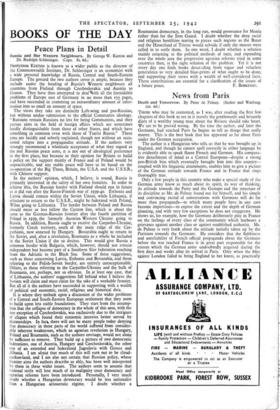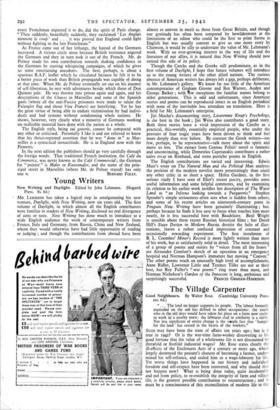News from Paris
THOSE who may be contented, as I was, after reading the first few chapters of this book to see in it merely the gentlemanly and leisurely diary of a wealthy young man about the Riviera should take heart. We are to be proved wrong. By the time the author, and later the Germans, had reached Paris he begins to tell us things that really matter. This is the best book that has appeared so far about Paris under the German occupation.
The author is a Hungarian who tells us that he was brought up in England, and though he cannot spell correctly in either language he is evidently able to speak fluent French and German. His compara- tive detachment of mind as a Central European—despite a strong pro-British bias which eventually brought him into this country— coupled with his linguistic attainments, enables him to give a picture of the German attitude towards France and in France that rings thoroughly true.
Only a few people in this country who make a special study of the German army know as much about its spirit, its way of thinking, its attitude towards the Party and the Gestapo and the structure of its discipline as Mr. de Polnay found out for himself, and his simple and convincing recital of conversations with Germans will do far • more than propaganda—to which many people have in any case become impervious—to expose the extent and the depth of German planning, and with very few exceptions he does not exaggerate. He shows us, for example, how the Germans deliberately play in France on the feelings of every class of the community which harbours a grievance against another class or against established authority. Mr. , de Polnay is very frank about the attitude initially taken up by the Parisians towards the Germans. He considers that the flabbiness and unreliability of French official propaganda about the Germans before the war reached France is in great part responsible for the esteem which the German army undoubtedly acquired during the first days and weeks after its arrival in Paris. Only when the blitz against London failed to bring England to her knees, as practically
every Frenchman expected it to do, did the spirit of Paris change. "Then suddenly, beautifully suddenly, they exclaimed ' Les Anglais tiennent le coup' and . . . it was proved that England could. fight without fighting to the last Frenchman."
As France came out of her lethargy, the hatred of the Germans increased. A vicious circle arose because British resistance angered the Germans and they in turn took it out of the French. Mr. de Polnay made his own contribution towards shaking confidence in the Germans by starting whispering campaigns, of which he gives us some entertaining anecdotes. The best, perhaps, is about a spurious R.A.F. leaflet which he circulated because he felt it to be a better piece of work than British propaganda was capable of doing at that time. When Mr. de Polnay eventually set out on his journey of self-liberation, he met with adventures beside which those of Don Quixote pale. He was thrown into prison again and again, and his descriptions of the Chaves in Marseilles and some of the Spanish gaols (where all the anti-Fascist prisoners were made to salute the Falangist flag and shout Viva Franco) are horrifying. Yet he has the great virtue of being able to endure victimisation by bad indivi- duals and bad systems without condemning whole nations. He shows, however, very clearly what a minority of Germans working on malleable material have done with the nation as a whole.
The English style, being sui generic, cannot be compared with any other or criticised. Personally I like it and am relieved to know that his thrice-repeated assertion that he was "done in" at Mar- seilles is a syntactical inexactitude. He is in England now with the Pioneers.
In the next edition the publishers should go very carefully through the foreign words. That traditional French institution, the Café du Commerce, was never known as the Café Commercial ; the German for " painter " is Maler or Kunstmaler, and the name of the prin- cipal street in Marseilles (where Mr. de Polnay stayed) has only



























 Previous page
Previous page